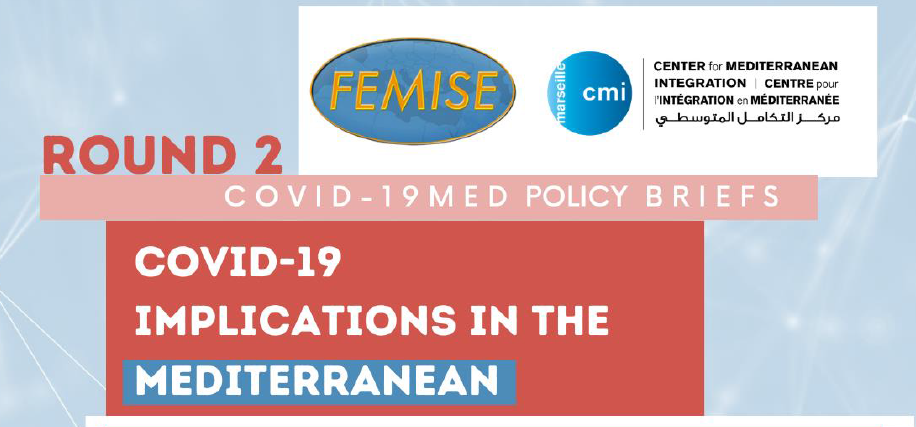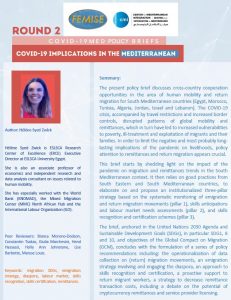 The coronavirus has proved to be a serious threat not only to people’s health but also to economies and societies of all countries, regardless of their level of development. This crisis presents a real test to the resilience of the Southern and Eastern Mediterranean countries, as it came at a time when they were challenged to keep their economies growing, facing increasing unemployment and scarce resources. The way out of the crisis will greatly depend on how countries in the region prioritise their actions, and on how they integrate and cooperate with each other in key sectors. Following the success of the first round of “COVID-19 MED BRIEFS” launched by the Center for Mediterranean Integration (CMI) and FEMISE, the two institutions decided to join forces again and launch a second round. This series of Policy Briefs is intended to pave the way for more in-depth thematic analyses and recommendations.
The coronavirus has proved to be a serious threat not only to people’s health but also to economies and societies of all countries, regardless of their level of development. This crisis presents a real test to the resilience of the Southern and Eastern Mediterranean countries, as it came at a time when they were challenged to keep their economies growing, facing increasing unemployment and scarce resources. The way out of the crisis will greatly depend on how countries in the region prioritise their actions, and on how they integrate and cooperate with each other in key sectors. Following the success of the first round of “COVID-19 MED BRIEFS” launched by the Center for Mediterranean Integration (CMI) and FEMISE, the two institutions decided to join forces again and launch a second round. This series of Policy Briefs is intended to pave the way for more in-depth thematic analyses and recommendations.
The twentieth COVID-19 MED BRIEF, entitled “Unlocking the potential of returned migrants in South Mediterranean countries through a three-pillar strategy” by Hélène Syed Zwick is available here
 Summary :
Summary :
The present policy brief discusses cross-country cooperation opportunities in the area of human mobility and return migration for South Mediterranean countries (Egypt, Morocco, Tunisia, Algeria, Jordan, Israel and Lebanon). The COVID-19 crisis, accompanied by travel restrictions and increased border controls, disrupted patterns of global mobility and remittances, which in turn have led to increased vulnerabilities to poverty, ill-treatment and exploitation of migrants and their families. In order to limit the negative and most probably long-lasting implications of the pandemic on livelihoods, policy attention to remittances and return migration appears crucial.
This brief starts by shedding light on the impact of the pandemic on migration and remittances trends in the South Mediterranean context. It then relies on good practices from South Eastern and South Mediterranean countries, to elaborate on and propose an institutionalized three-pillar strategy based on the systematic monitoring of emigration and return migration movements (pillar 1), skills anticipations and labour market needs assessments (pillar 2), and skills recognition and certification schemes (pillar 3).
The brief, anchored in the United Nations 2030 Agenda and Sustainable Development Goals (SDGs), in particular SDG1, 8 and 10, and objectives of the Global Compact on Migration (GCM), concludes with the formulation of a series of policy recommendations including: the operationalization of data collection on (return) migration movements, an emigration strategy involving and engaging the diaspora, an approach to skills recognition and certification, a proactive support to return migrant workers, a strategy to decrease remittance transaction costs, including a debate on the potential of cryptocurrency remittances and service provider licensing.
This Policy Brief is produced as part of the series of Policy Briefs on « Responding to the Challenges of COVID-19 in the Mediterranean » that is undertaken in partnership between FEMISE and the Center for Mediterranean Integration (CMI).
The views expressed in this Brief are those of the authors and do not reflect the views of CMI or FEMISE. The contents have not been subjected to verification by CMI or FEMISE and their publication does not reflect ownership by CMI or FEMISE.


